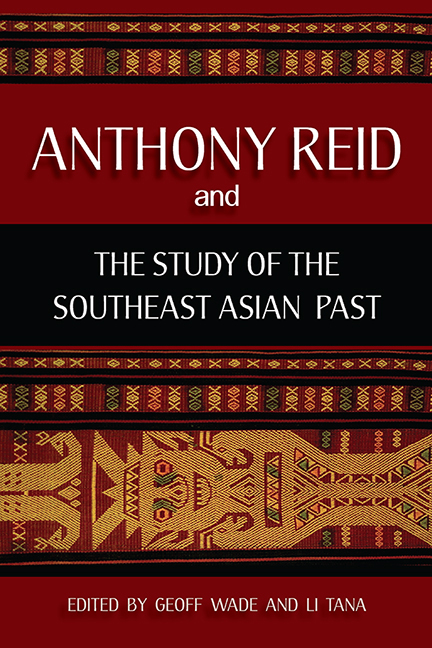Book contents
- Frontmatter
- Contents
- Acknowledgements
- The Contributors
- PART I Introduction
- PART II The Scholarship of Anthony Reid
- 2 The Past as Threat, the Past as Promise: The Historical Writing of Anthony Reid
- PART III Southeast Asia in the World
- PART IV Early Modern Southeast Asia
- PART V Modern Southeast Asia
- Appendix
- Index
- Plate section
2 - The Past as Threat, the Past as Promise: The Historical Writing of Anthony Reid
from PART II - The Scholarship of Anthony Reid
Published online by Cambridge University Press: 21 October 2015
- Frontmatter
- Contents
- Acknowledgements
- The Contributors
- PART I Introduction
- PART II The Scholarship of Anthony Reid
- 2 The Past as Threat, the Past as Promise: The Historical Writing of Anthony Reid
- PART III Southeast Asia in the World
- PART IV Early Modern Southeast Asia
- PART V Modern Southeast Asia
- Appendix
- Index
- Plate section
Summary
In March 2007 the Indonesian Attorney-General, Abdul Rahman Saleh, issued a decree banning some fourteen school history text books and ordering that all copies be withdrawn from use and burned. The grounds which the Attorney-General offered for this drastic action were that the books had failed to mention the 1948 Madiun Revolt by the Indonesian Communist Party (PKI) and had referred to the 1965 coup in Jakarta as G/30/S, omitting the suffix ‘-PKI’, previously used in all official statements to link the coup to the communists. That coup, still poorly understood, involved the murder of six senior anti-communist generals and appears to have been an attempt by junior, leftist officers and leading elements from the Communist Party to forestall a predicted military coup and to shift Indonesian politics decisively to the Left. Just over two years later, in September 2009, a coalition of Islamic and conservative groups joined forces in Surabaya to burn copies of the newlyreleased memoirs of one of the leaders of the Madiun Revolt.
Some observers have treated these manifestations of anti-Communism as a regrettable relic of the sustained propaganda effort of the Suharto era; others see them as an aspect of Islamist assertiveness against Indonesia's secularist traditions. Nonetheless, hostility to the Indonesian Communist Party, so anomalous now in a world where most Communist parties have either collapsed or embarked unashamedly on a capitalist road, seems to be located at least partly in a deeper Indonesian attitude to history.
The historian John Lukacs has identified historical consciousness as the sense that the present is different from the past in ways that have to do with the outcome of human endeavours. He identifies historical consciousness as supremely characteristic of the modern world, because it leads to (or from) the conclusion that human effort can bring about change for the better in the human condition. Here, however, I am interested in the narrower question of the way in which modern Indonesians recruit the events and conditions of the past to provide lessons for the present. Any attempt to explore the collective historical consciousness is necessarily speculative, but I want to suggest that recent Indonesian attitudes to the historical past have generally constructed it as a source of menace, rather than inspiration.
- Type
- Chapter
- Information
- Anthony Reid and the Study of the Southeast Asian Past , pp. 31 - 44Publisher: ISEAS–Yusof Ishak InstitutePrint publication year: 2012

